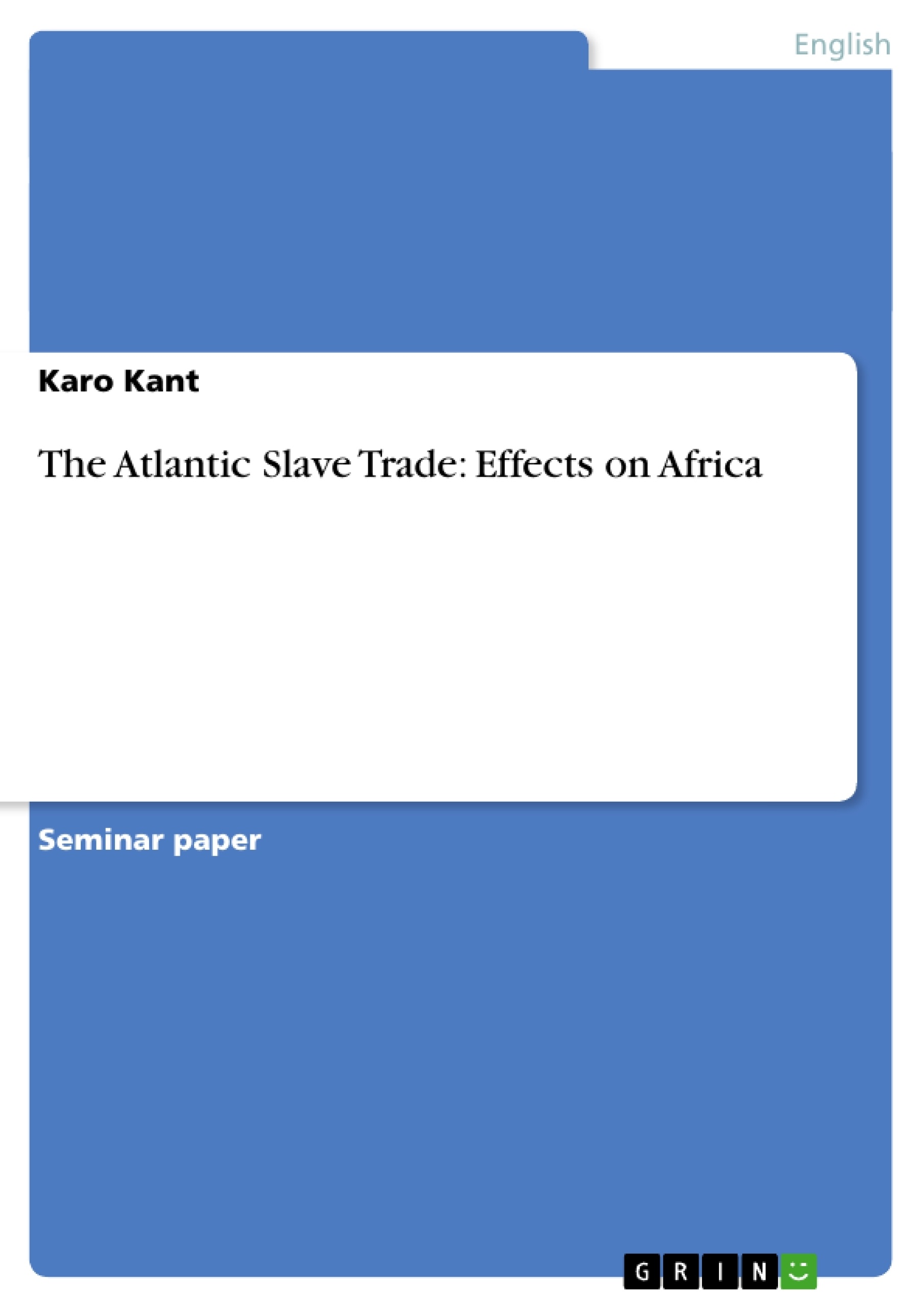In the sixteenth century, when Europe's interest in Africa moved away from deposits of gold to the need of work force, the Atlantic Slave Trade began. Because of expansion to the New World, Europeans needed reliable workers who were not suffering seriously from diseases and who were used to a tropical climate. After indigenous peopled had proved unreliable and unsuited, African people emerged as excellent workers because they were used to the climate, resistant to tropical diseases, and also hard working on plantations (Boddy-Evans).
The Atlantic Slave Trade took place across the Atlantic ocean, from the Western coast of Europe where goods were brought to the Western part of Africa. Slaves were then shipped through the Middle Passage to the New World and were traded with goods, which were brought to Europe. The so-called triangular trade ended in the nineteenth century through the abolition of slavery.
Considering the forced migration of African people, the continent suffered great losses. About 13 million people were shipped to the Americas. There are still debates as to how much the continent was, and still is, affected by the trade. Due to the fact that slavery was not new to Africans and the influx of goods, the continent gained material benefits. But the loss of people and, therefore, the loss of work force for the continent itself, prove that Africa still suffers from that period. In particular, continuous poverty and underdevelopment play a major role (Boddy-Evans).
The following will be focused on the effects on the economy, society, and people in Africa due to the Atlantic Slave Trade. It will be clarified how Africa changed and how great the effects on African society were and still are today. A working paper on a conference about reparations will be included to illuminate today's extent of the effects.
Table of Contents
- Introduction
- Effects on Africa
- Economy
- Society and People
Objectives and Key Themes
This text explores the lasting effects of the Atlantic Slave Trade on Africa, focusing on its impact on the economy, society, and people. The primary goal is to illuminate the complexities of the trade's consequences, highlighting how Africa has been shaped by this historical event and continues to experience its effects today. This analysis examines both the direct and indirect consequences of the trade, considering both the perspectives of those who profited and those who suffered.
- The economic impact of the Atlantic Slave Trade on Africa.
- The societal changes and disruptions caused by forced migration.
- The enduring legacy of the slave trade on African people.
- The role of African traders and the dynamics of internal conflict.
- The ongoing challenges and implications of the slave trade for African development.
Chapter Summaries
The introduction provides a historical overview of the Atlantic Slave Trade, explaining its origins in the sixteenth century and its significance in the context of European expansion and the development of the New World. It highlights the devastating consequences of the trade for Africa, particularly the loss of human capital and its ongoing impact on poverty and underdevelopment.
The chapter on the effects on Africa delves into the economic and societal consequences of the slave trade. It examines the loss of workforce and its impact on economic development, contrasting the flourishing economies of Europe and the Americas with the hindered growth of Africa. It further discusses the role of African traders and the internal conflicts that fueled the trade, exploring the dynamics of profit and loss for different groups within Africa. This chapter also investigates the societal upheaval caused by forced migration, the militarization of society, and the enduring legacy of the slave trade on African people.
Keywords
The key terms and concepts explored in this text include the Atlantic Slave Trade, forced migration, economic impact, societal disruption, human capital loss, African traders, internal conflict, militarization, and underdevelopment. The text analyzes these themes through the lens of historical research and contemporary perspectives, aiming to provide a comprehensive understanding of the complex and enduring consequences of this historical event.
- Quote paper
- Karo Kant (Author), 2011, The Atlantic Slave Trade: Effects on Africa, Munich, GRIN Verlag, https://www.grin.com/document/191118




